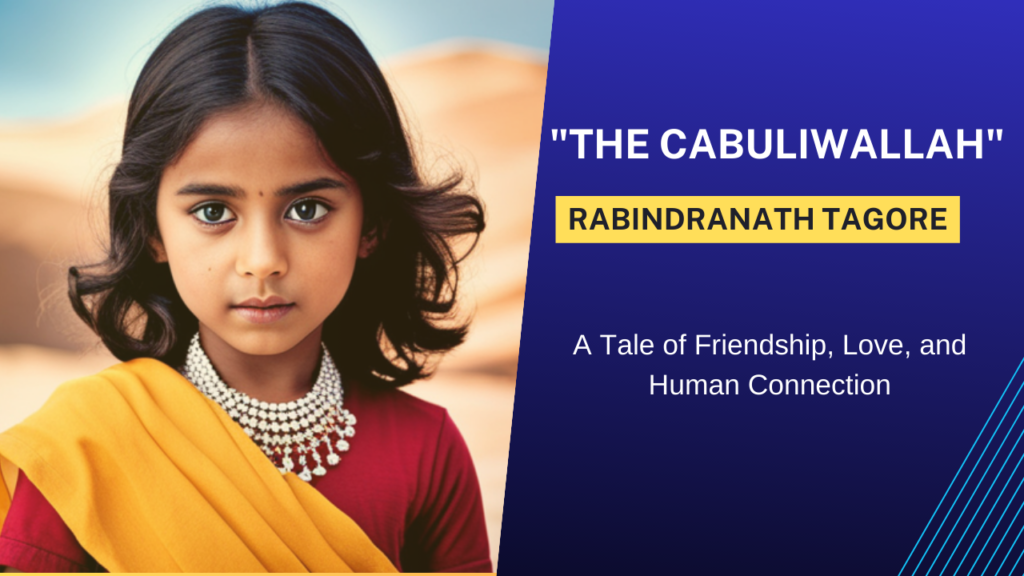"The Cabuliwallah" by Rabindranath Tagore
A Tale of Friendship, Love, and Human Connection
Rabindranath Tagore’s short story “The Cabuliwallah” is a poignant tale of a friendship between a father and a peddler from Afghanistan. The story is set in Kolkata, India, and explores the themes of friendship, love, and human connection in a world of cultural and social divides. The story is widely considered as a masterpiece of Tagore’s writing and has been adapted into films and stage productions in India and abroad.
The story begins with the arrival of a peddler from Afghanistan, popularly known as a “Cabuliwallah” in Kolkata. The Cabuliwallah, a tall, bearded man, dressed in a traditional Afghan outfit, arrives in the city to sell his wares, which include clothes, shawls, and spices. The protagonist of the story, a writer and father to a five-year-old girl named Mini, encounters the Cabuliwallah on the street and is intrigued by his exotic appearance.
The writer strikes up a conversation with the Cabuliwallah and learns that he has left his wife and daughter behind in Afghanistan to seek his fortune in India. The Cabuliwallah talks about his family, his life in Afghanistan, and his love for his daughter. The writer is struck by the depth of the Cabuliwallah’s love for his child, which reminds him of his own love for his daughter Mini.
The Cabuliwallah soon becomes a regular visitor to the writer’s house, where he and Mini strike up a friendship. Mini is fascinated by the Cabuliwallah’s appearance, his accent, and his wares. She accompanies him on his rounds, and the two exchange stories about their lives and families. The Cabuliwallah tells Mini about his daughter, who is about the same age as her, and how much he misses her.


Mini and the Cabuliwallah’s friendship blossoms over time, and she starts calling him “Cabuli Uncle.” The Cabuliwallah becomes fond of Mini and brings her gifts, including a box of almonds and a shawl. Mini’s mother is wary of the Cabuliwallah’s presence in their house and warns her husband that he may not be a trustworthy character.
One day, Mini’s mother goes to visit her parents in their hometown, and Mini is left in the care of her father. While playing with her father, Mini accidentally breaks a necklace that belonged to her mother. The father, being a writer, gets engrossed in his work, forgetting about the broken necklace. When Mini’s mother returns, she notices that the necklace is missing and accuses the Cabuliwallah of stealing it.
The father is taken aback by the accusation and defends the Cabuliwallah, saying that he is a good man and would not steal. However, when the police come to investigate, they find the broken necklace in the Cabuliwallah’s bag. The Cabuliwallah is arrested and sent to jail, leaving Mini heartbroken.
Years pass, and Mini grows up and gets married. She becomes a mother herself and realizes the depth of love that a parent has for their child. One day, she comes across a box of almonds and a shawl that she had received as a gift from the Cabuliwallah many years ago. She remembers her friendship with him and wonders what happened to him.
She goes to visit him in jail, and the Cabuliwallah is overjoyed to see her. He tells her that he has served his sentence and is about to return to Afghanistan. He also reveals that his daughter, whom he missed so much, is now a grown woman and is getting married. Mini gives him some money and gifts for his daughter, and the two part on good terms.
The story of “The Cabuliwallah” ends with Mini realizing that the Cabuliwallah’s love for his daughter is no different than her own love for her child. She reflects on the power of love and human connection to transcend cultural and social divides. The story highlights the importance of empathy and understanding in bridging the gap between different cultures and communities.
Tagore’s “The Cabuliwallah” is a timeless story that continues to resonate with readers around the world. The story captures the universal human experience of love, loss, and redemption, and the power of friendship to overcome barriers of language and culture. The story also sheds light on the challenges faced by immigrants and peddlers who often struggle to make a living in a new and unfamiliar land.
The Cabuliwallah, in particular, represents the struggles of Afghan immigrants in India during the early twentieth century. These peddlers were often viewed with suspicion and mistrust by the local population, who saw them as outsiders and potential threats to their way of life. The story challenges these stereotypes and shows the human face behind the Cabuliwallah’s exotic appearance.
The character of Mini, on the other hand, represents the innocence and curiosity of childhood. Her friendship with the Cabuliwallah is a testament to the power of human connection to transcend cultural and social barriers. The story also shows the importance of empathy and understanding in overcoming prejudice and mistrust.
The story also highlights the importance of forgiveness and redemption. The Cabuliwallah, despite being accused of stealing, is not a bad person. He is simply a father who loves his daughter and is trying to make a living in a new and unfamiliar land. The story shows that even in the face of adversity and misunderstanding, it is possible to find redemption and forgiveness.
In conclusion, Tagore’s “The Cabuliwallah” is a timeless story that captures the universal human experience of love, loss, and redemption. The story highlights the power of friendship and human connection to overcome cultural and social divides. It also sheds light on the challenges faced by immigrants and peddlers in a new and unfamiliar land. The story is a reminder of the importance of empathy, understanding, and forgiveness in building bridges between different cultures and communities. “The Cabuliwallah” is a masterpiece of Tagore’s writing and continues to inspire readers around the world.

